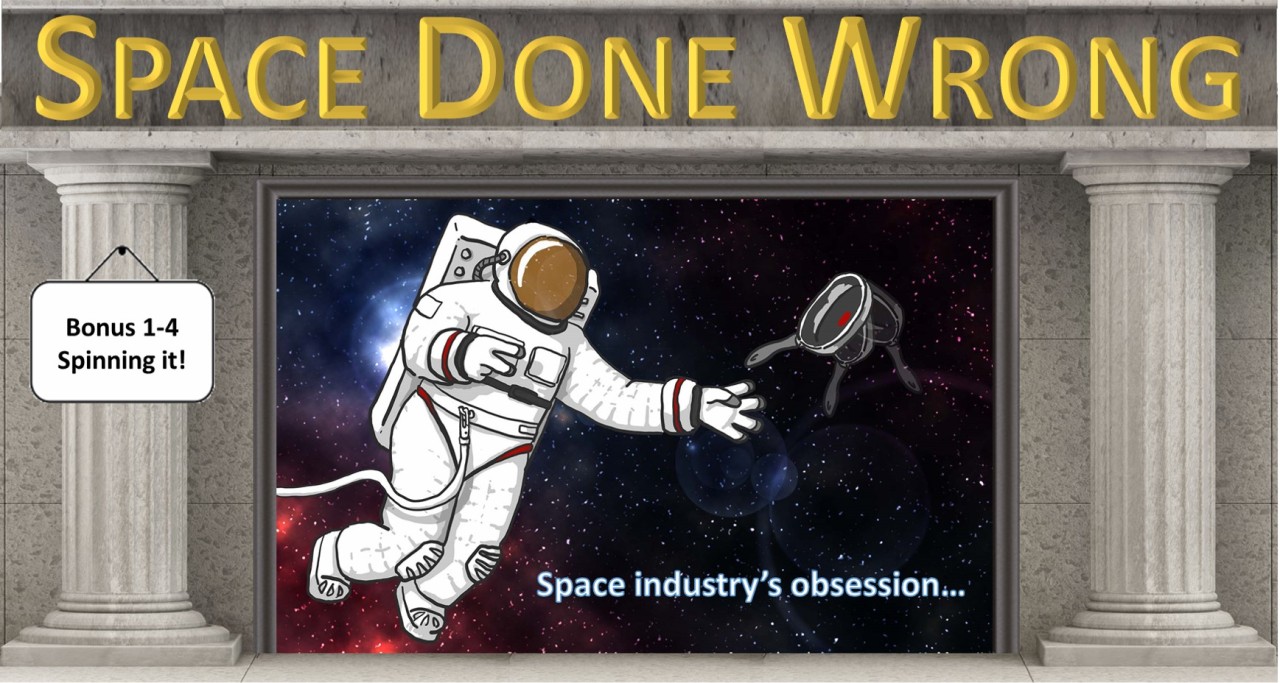Have you ever heard a a bus driver talk about the many things that were spun off by their industries? Probably not. So why is the space industry so obsessed with it? Let’s spin it!
On the origins of the space industry

First, we need to get a few things straight: we got rockets because we looked for better ways to drop stuff on our neighbors’ heads, we got earth observation by satellites because we wanted to know what they were doing while we were building our rockets. We got satellite communication to have a communication channel to our troops that could not easily be interrupted, and we got global navigation because that allowed a better way to know where our planes and rockets were flying, where to drop our bombs and where our tanks were going. Then we got human space flight and we got a man on the moon mainly to stick it to the other side and motivate our own.

Where did the spinoffs come from?
The task to “stick it to the other guy” took a front role during the cold war. However, being somewhere first is not a sustainable motivation, so NASA was in dire need of a justification after the deed was done. Thus, in 1976 (in the midst of the post Apollo budget crisis) they coined the phrase “spinoff.” These were technologies that trickled down from space. No better way to underline what space did for “normal” people how it could reach into their very lives. And would you have known: since then, NASA delivered to us more than 2,000 technologies, and ESA did 150.

What we can learn from this is an indication of when to talk about spinoffs. Broadly, when you are in crisis and have doubts about the justification of what you are doing. When you ask yourself or are being asked by the taxpayer, was it worth it? If you have good answers to this question, why focus on secondary benefits?
Space—is it worth it?
Well, fortunately, we did not stop with the early use cases. We did not stop with the military applications. We did not stop with the pride missions. We did not stop with spinoff products but developed applications to the true benefit of society:
Space Transportation
Those rockets which transported atomic bombs have matured into a reliable delivery tool that enabled many earthbound applications.
– SpaceX is a true pacemaker when it comes to low launch prices and a driver of innovation. We even got liquid flyback boosters, which during my studies in the early 2000s was proclaimed the next to impossible holy grail.
– Micro launchers still need to prove their commercial value. What they proved already was how far we came along since WWII. Remember the Ariane and before it the Europa rocket? Both did not allow for a German first stage as this could have been used for an ICBM. Yet, today, no less than three German companies (Rocket Factory Augsburg, Isar Aerospace, HyImpulse Technologies) peacefully build rockets with no public outcry from our neighbors. It seems that fear of a warmongering Germany is, fortunately, a thing of the past.
Earth Observation
Earth observation gives us a global understanding of the world that allows us to act if we so wish.

– NASA satellites detected the ozone hole, and global action allowed us to mitigate it.
– Dedicated GEO and LEO satellites from EUMETSAT and other organizations worldwide deliver data that help us understand and predict the weather and give insight into the ongoing climate catastrophe.
– Private mapping satellites like those of Planet or IcEye help us monitor natural resources, predict crop failure, and help mitigate natural and human-made disasters.
Telecommunications
Communication satellites enable us to bridge the gap between continents.

– GEO stationary telecom and TV satellites like those from SES and others are one of the truly commercial ventures of the space industry. Often challenged by ground-based services to achieve the best pricing, yet, in many regions, they are ones to get the job done.
– Miniature satellites like those of Orbcomm enable machine to machine communications.
– Mega Constellations like OneWeb and Starlink promise us to bring global internet all the while we are keeping our fingers crossed that they won’t bring us the Kessler syndrome, too.
Satellite Navigation
Global navigation systems once guided smart bombs, but today, hardly anyone could find their way without it.

– With “GPS” receivers in every phone, global navigation systems guide us turn-by-turn in exploring the world.
– Undenied high precision of Galileo allows reliable emergency services.
– Entire logistics chains depend on the availability of GNSS data.
These are the many things that space brings to society. So, let’s stop talking about spinoffs.
Concluding Remarks:
It is better to talk about what new applications we as an industry can bring to humanity ideally since we are the means and not the end, and how we can provide these services in an innovative way, one that is least taxing on the resources that we are being provided with.
I hope you liked this article. It is part of a series #spacedonewrong. You can find the start article here:


Leave a Reply